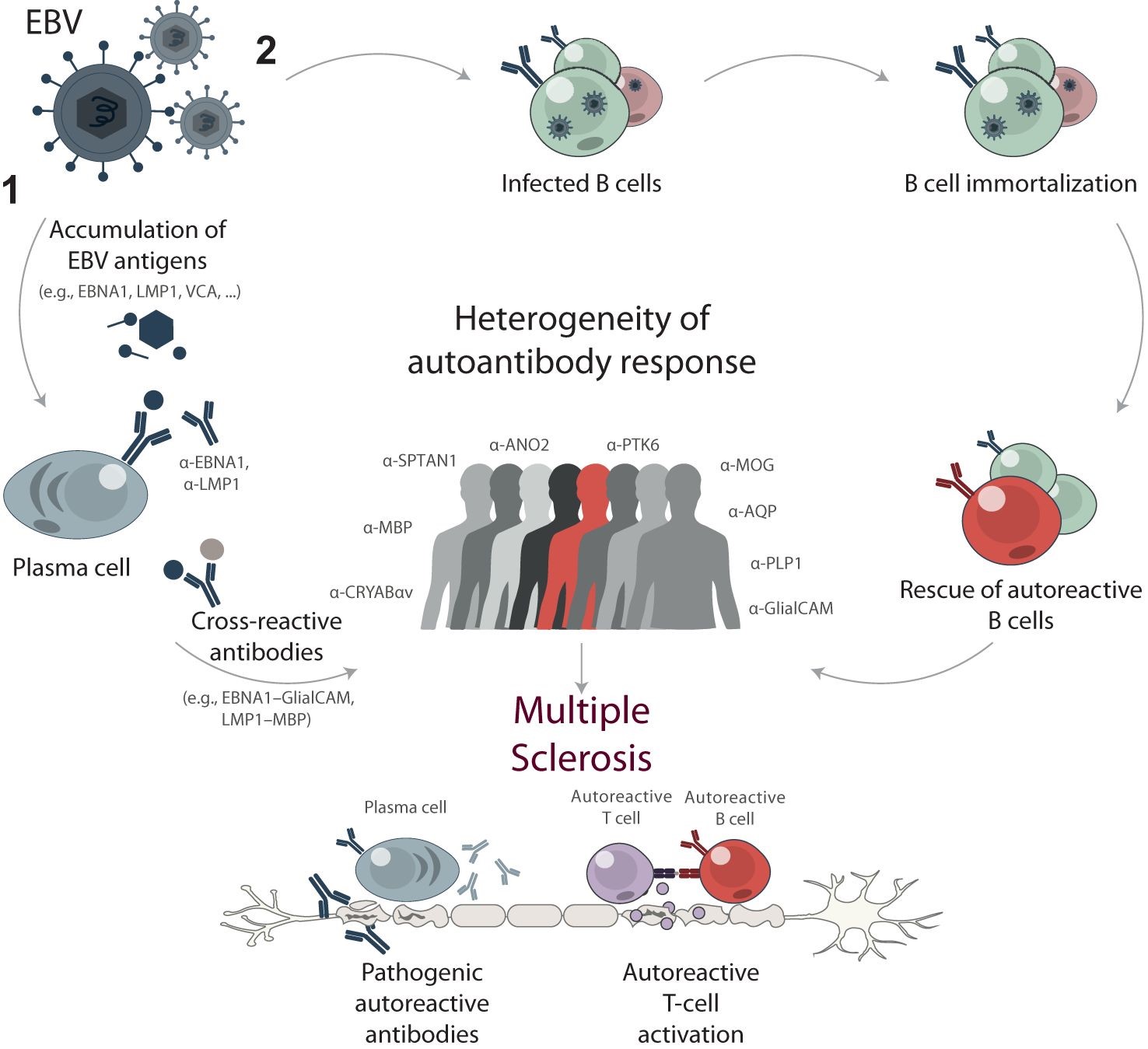Immune System Error: How Antibodies in Multiple Sclerosis Mistake Their Targets

Researchers at HSE University and the Institute of Bioorganic Chemistry of the Russian Academy of Sciences (IBCh RAS) have studied how the immune system functions in multiple sclerosis (MS), a disease in which the body's own antibodies attack its nerve fibres. By comparing blood samples from MS patients and healthy individuals, scientists have discovered that the immune system in MS patients can mistake viral proteins for those of nerve cells. Several key proteins have also been identified that could serve as new biomarkers for the disease and aid in its diagnosis. The study has been published in Frontiers in Immunology. The research was conducted with support from the Russian Science Foundation.
Multiple sclerosis (MS) is a disease in which the immune system mistakenly attacks the myelin sheath that surrounds nerve fibres. Myelin can be thought of like the insulation around electrical wires: when it deteriorates, signals between neurons are transmitted less effectively. This leads to difficulties with movement, vision, speech, and memory. The disease progresses in waves, with periods of exacerbation followed by remission; however, over time, the damage accumulates and may lead to disability. Diagnosing multiple sclerosis is challenging, as symptoms vary from patient to patient, and there are still no reliable biomarkers for a definitive diagnosis.
The causes of the immune system's malfunction are not yet fully understood, but scientists believe that viral infections may play a role. To gain deeper insight into the immune response in the disease, scientists from HSE University–St Petersburg and the Shemyakin–Ovchinnikov Institute of Bioorganic Chemistry of the Russian Academy of Sciences conducted a study comparing the antibodies of patients with multiple sclerosis to those of healthy individuals. The researchers used PhIP-Seq, a technology that identifies the antigens against which an individual already has antibodies.
Antigens are foreign molecules that trigger an immune response. They are found on the surfaces of bacteria, viruses, and other cells, prompting the immune system to respond by producing antibodies.
Antibodies are proteins produced by the immune system to combat antigens. Antibodies act like 'keys' that recognise and bind to 'locks'—antigens—in order to neutralise them or mark them for destruction by other immune cells.
PhIP-Seq not only identifies the antibodies but also determines which proteins they interact with. This enables the creation of a detailed profile of the immune response, revealing the specific targets the immune system is attacking.

Igor Eliseev
'We selected about a thousand proteins capable of triggering an autoimmune response and fragmented them into small overlapping peptides—short chains of amino acids that make up proteins. Using genetic engineering, these peptides were then displayed on bacteriophages, with each phage presenting a specific peptide on its surface,' explains Igor Eliseev, Academic Supervisor of the Computational Biology and Bioinformatics Master's programme at the HSE Campus in St Petersburg. 'The modified phages were then added to the patients’ blood samples. If antibodies in the blood recognised specific peptides, they bound to the phages, forming complexes. Next, we extracted these complexes and analysed which proteins triggered the immune response.'
PhIP-Seq helped identify autoantibodies—antibodies that mistakenly target the body’s own proteins. The scientists found that in MS patients, the immune system reacts particularly strongly to the SPTAN1 protein, which plays a crucial role in the structure of nerve cells, as well as to the viral protein LMP1, which is associated with the Epstein–Barr virus (EBV). In patients with aggressive forms of MS, the immune response was even broader, with cross-reactivity causing the immune system to attack both viral proteins and the body’s own tissues. Put simply, the immune system behaved as though it were confusing viral proteins with the body’s own proteins.

'Our study showed that autoimmune antibodies in multiple sclerosis respond to a broad range of proteins,' explains Yakov Lomakin, Project Head and Senior Research Fellow at IBCh RAS. 'This indicates reduced specificity: instead of precisely targeting one protein, the antibodies bind to various targets, making the immune response chaotic and destructive.'
During the experiment, the scientists tested whether a combination of several proteins could serve as a biomarker for the disease. They found that testing for four antigens—SPTAN1, PTK6, PRX (nervous system proteins), and LMP1 (an EBV protein)—can distinguish MS patients from healthy individuals with high accuracy. These findings can not only improve diagnosis but also pave the way for new treatment approaches, such as targeted therapies that block misguided immune responses.
See also:
HSE AI Research Centre Simplifies Particle Physics Experiments
Scientists at the HSE AI Research Centre have developed a novel approach to determining robustness in deep learning models. Their method works eight times faster than an exhaustive model search and significantly reduces the need for manual verification. It can be applied to particle physics problems using neural networks of various architectures. The study has been published in IEEE Access.
Scientists Show That Peer Influence Can Be as Effective as Expert Advice
Eating habits can be shaped not only by the authority of medical experts but also through ordinary conversations among friends. Researchers at HSE University have shown that advice from peers to reduce sugar consumption is just as effective as advice from experts. The study's findings have been published in Frontiers in Nutrition.
HSE University to Host Second ‘Genetics and the Heart’ Congress
HSE University, the National Research League of Cardiac Genetics, and the Central State Medical Academy of the Administrative Directorate of the President will hold the Second ‘Genetics and the Heart’ Congress with international participation. The event will take place on February 7–8, 2026, at the HSE University Cultural Centre.
HSE University Develops Tool for Assessing Text Complexity in Low-Resource Languages
Researchers at the HSE Centre for Language and Brain have developed a tool for assessing text complexity in low-resource languages. The first version supports several of Russia’s minority languages, including Adyghe, Bashkir, Buryat, Tatar, Ossetian, and Udmurt. This is the first tool of its kind designed specifically for these languages, taking into account their unique morphological and lexical features.
HSE Scientists Uncover How Authoritativeness Shapes Trust
Researchers at the HSE Institute for Cognitive Neuroscience have studied how the brain responds to audio deepfakes—realistic fake speech recordings created using AI. The study shows that people tend to trust the current opinion of an authoritative speaker even when new statements contradict the speaker’s previous position. This effect also occurs when the statement conflicts with the listener’s internal attitudes. The research has been published in the journal NeuroImage.
Language Mapping in the Operating Room: HSE Neurolinguists Assist Surgeons in Complex Brain Surgery
Researchers from the HSE Center for Language and Brain took part in brain surgery on a patient who had been seriously wounded in the SMO. A shell fragment approximately five centimetres long entered through the eye socket, penetrated the cranial cavity, and became lodged in the brain, piercing the temporal lobe responsible for language. Surgeons at the Burdenko Main Military Clinical Hospital removed the foreign object while the patient remained conscious. During the operation, neurolinguists conducted language tests to ensure that language function was preserved.
HSE MIEM and AlphaCHIP Innovation Centre Sign Cooperation Agreement
The key objectives of the partnership include joint projects in microelectronics and the involvement of company specialists in supervising the research activities of undergraduate and postgraduate students. Plans also focus on the preparation of joint academic publications, the organisation of industrial placements and student internships, and professional development programmes for the company’s specialists.
AI Overestimates How Smart People Are, According to HSE Economists
Scientists at HSE University have found that current AI models, including ChatGPT and Claude, tend to overestimate the rationality of their human opponents—whether first-year undergraduate students or experienced scientists—in strategic thinking games, such as the Keynesian beauty contest. While these models attempt to predict human behaviour, they often end up playing 'too smart' and losing because they assume a higher level of logic in people than is actually present. The study has been published in the Journal of Economic Behavior & Organization.
HSE University and InfoWatch Group Sign Cooperation Agreement
HSE University and the InfoWatch Group of Companies marked the start of a new stage in their collaboration with the signing of a new agreement. The partnership aims to develop educational programmes and strengthen the practical training of specialists for the digital economy. The parties will cooperate in developing and reviewing curricula, and experts from InfoWatch will be involved in teaching and mentoring IT and information security specialists at HSE University.
Scientists Discover One of the Longest-Lasting Cases of COVID-19
An international team, including researchers from HSE University, examined an unusual SARS-CoV-2 sample obtained from an HIV-positive patient. Genetic analysis revealed multiple mutations and showed that the virus had been evolving inside the patient’s body for two years. This finding supports the theory that the virus can persist in individuals for years, gradually accumulate mutations, and eventually spill back into the population. The study's findings have been published in Frontiers in Cellular and Infection Microbiology.


